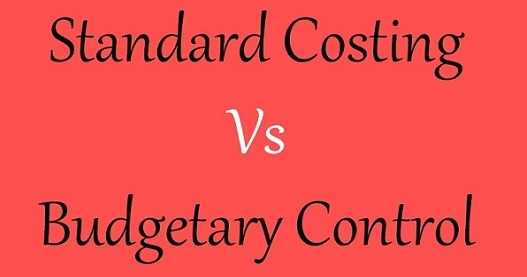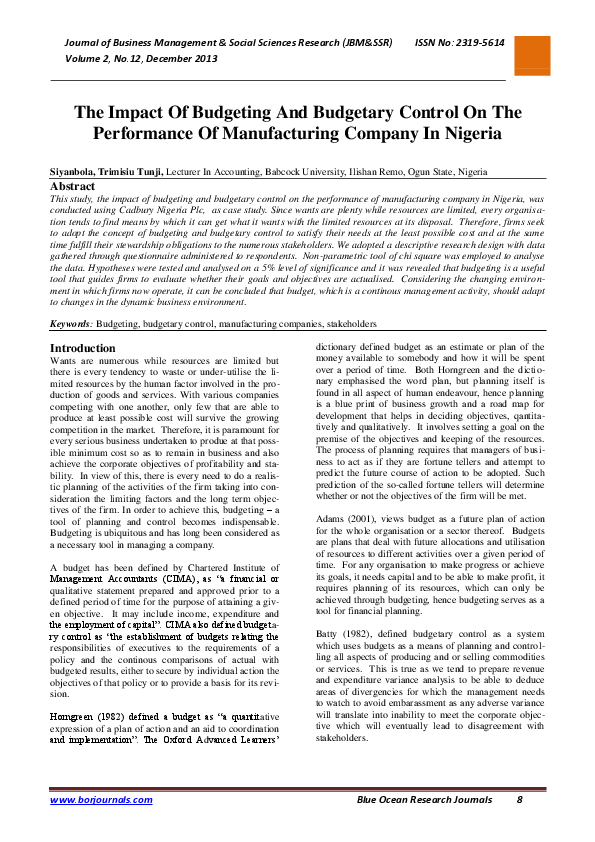What is Budgetary Control?
There are several reasons that can account for differences found between the budgeted and actual expenditure. The reasons for all variances needs to be identified. This process is critical to effective budgetary control, as the budget holder needs to know when it is appropriate to take corrective action. Variances can be both positive and negative, reflecting excess spending or under spending, or over/under performance on income. Budgetary control is the process by which budgets are prepared for the future period and are compared with the actual performance for finding out variances, if any.
Further, the results of the business are closely monitored by a budget committee, which provides feedback to managers whenever actual results threaten to fall below expectations. Budgetary control is a system which uses budgets as means of planning and controlling all aspects of producing/or selling commodities and services. Budgetary control of sales and costs is obtained through executive action, guided by the monthly comparisons of actual and the planned results. Budgeting is merely a part of budgetary control which involves the preparation of budgets.
For example, a business might have an advertising budget, a purchasing budget, a sales budget, a manufacturing budget, a research and evelopment budget, and a cash budget. New and ongoing projects would each have a detailed budget. Each budget would then be compiled into a master budget for the operations of the entire company.
Budgetary control provides for the preparation of variance report which contains a comparatives study of actual and budgeted figures with variances. Budgetary control is a powerful tool to control expenditure. Budgets provide a yardstick to evaluate actual performance of departments and persons working in the organisation. It lays emphasis on proper staff organisation and prevents buck passing when the budgeted results are not achieved. At the same time delegation of authority, assignment of responsibility and coordination among the activities of various personal and departments is made possible.
Some businesses create the master budget in conjunction with other budgets, such as sales, marketing, general and administrative, production, labor, materials and overhead. The purposes of budgeting are for resource allocation, planning, coordination, control and motivation. It is also an important tool for decision making, monitoring business performance and forecasting income and expenditure. With proper budgeting, limited resources are managed efficiently. In a budget control system, a firm assigns targets to each department, individual, etc.
It is the managerial process of budget planning and preparation, budgetary control and the related procedures. Budgeting is the highest level of accounting in terms of future which indicates a definite course of action and not merely reporting. Budgetary Control System is being viewed by the corporate society as an effective management tool for both minimizing cost, and maximizing revenue and profits.
Management
Each month, he will get a copy of the departmental budget report. From the report, head of the department can visualise at once where he has over-or under-spent his budgeted allowance.

Objectives of Budgetary Control:
A budget is used for cost control purposes and it is one of the most important overall control devices employed by management. A budget represents the financial requirements of different sections of the business during a given period to achieve an estimated profit based upon a given volume of sales. A budget is an instrument of management used as an aid in the planning, programming and control of business activity. It may include income, expenditure and employment of capital.
What are the objectives of budgetary control?
Budgetary control is the process of determining various actual results with budgeted figures for the enterprise for the future period and standards set then comparing the budgeted figures with the actual performance for calculating variances, if any.
A specific budget provides information on how much a business can spend every month. Moreover, it lets a business owner know how much profit to make to meet all expenses. The usefulness of budgeting depends on accuracy of available information. Budgetary control is a system of procedures used to ensure that an organization’s actual revenues and expenditures adhere closely to its financial plan. The system typically involves setting personal goals for managers that are based on the budget, along with a set of rewards that are triggered when the goals are attained.
It then compares the budgeted performance with the actual one. The firm then reports the performance of each department to the top management. Hence, budget control serves as an effective tool for measuring the performance of departments, individuals and cost centres. The difference between the actual income and expenditure and the budgeted income and expenditure is called a “variance”. Variance analysis is an important technique in the budgetary control process.
First of all, budgets are prepared and then actual results are recorded. The fourth and final step usually occurs at the end of an accounting period. After management has a chance to look over the entire last period, they can start making plans for the next year. For example, they will most likely review the original budget that was created and why certain goals were set.
- A business owner has to predict whether the company will be profitable.
- Budgeting is critical in the business planning process.
Budgeting is critical in the business planning process. A business owner has to predict whether the company will be profitable. Budgeting provides a model of the potential financial performance of a business, given that specific strategies and plans are followed. It provides a financial framework for making important decisions. To manage a business effectively, expenditure must be properly controlled.
Then they will compare the actual with the budgeted performance over the entire period. Lastly, management will focus on how they tried to correct the problem operations and develop a plan to fix them in the next period. Budgeting is the process of designing, implementing and operating budgets.
Budgetary control attempts to show the plans in financial terms. Budgetary control is the planning in advance of the various functions of a business so that the business can be controlled.
FINANCE YOUR BUSINESS
As opined by Dr. S.N. Maheshwari, it acts as a friend, philosopher and guide to the management. As opined by Dr. S. N. Maheshwari, it acts as a friend, philosopher and guide to the management. The budget committee will create standard budget forms on which production plans, estimated income and costs may be inserted for each section or department of the business concern. Deviations from predicted plan or performance are noticed by comparing actual and budgeted performances and costs. A budget can be thought of as an overall plan for the operation of the business in terms of sales, production and expenditures.
The comparison of budgeted figures with actual figures will help the management to find out variances and take corrective actions without any delay. Budgetary control makes use of budgets for planning and controlling all aspects of producing and/ or selling products or services.
Good budgetary control necessitates establishment of accounting procedures to record actual operations in terms of sales, income, production, etc. within a department. The head of each department will receive a copy of the budget appropriate to his activity.
epartment managers in a business make decisions every day that affect the profitability of the business. In order to make effective decisions and coordinate the decisions and actions of the various departments, a business needs to have a plan for its operations. Planning the financial operations of a business is called budgeting. A budget is a written financial plan of a business for a specific period oftime, expressed in dollars. Each area of a business’s operations typically has a separate budget.
Thus budget acts as a coordinating device among the various functions of the business. The comparison of budgeted and actual figures will enable the management to find out discrepancies and take remedial measures at a proper time. The budgetary control is a continuous process which helps in planning and co-ordination. A budget is a means and budgetary control is the end-result.

An example of how budgeting plays a role in decision making is when spending money on advertising. When the budget allocated for this aspect has been completely used, the decision is likely to stop spending money on it. Budgeting also helps measure the forecast business performance against the actual business performance. It allows a business owner or manager to determine whether the business lives up to expectations through differences between budgeted and actual expenditure.
Accounting Notes
Budgets can only be controlled if corrective action is taken in response to the variances. Sometimes the explanation for the variance results in no action being required. This is where the variance will diminish over time as the actual income and expenditure figures naturally match up with the budget. Variances that arise because of fundamental changes, such as an increase in demand for a service, require action.